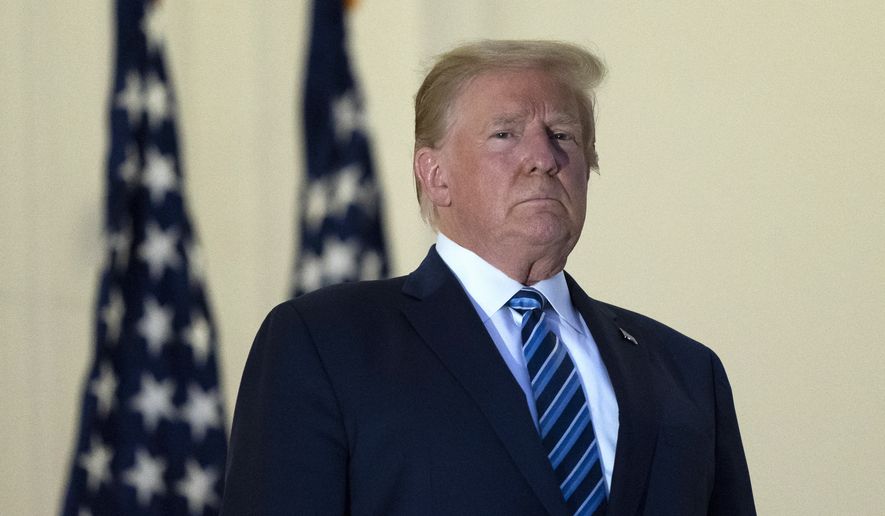President Trump said Tuesday that he’s calling off coronavirus relief negotiations until after the November elections, sparking concern in Congress from both parties.
After more than a week of talks between House Speaker Nancy Pelosi and Treasury Secretary Steven T. Mnuchin, the president called off negotiations and accused Democrats of not acting in good faith.
“Nancy Pelosi is asking for $2.4 Trillion Dollars to bailout poorly run, high crime, Democrat States, money that is in no way related to COVID-19. We made a very generous offer of $1.6 Trillion Dollars and, as usual, she is not negotiating in good faith,” Mr. Trump tweeted.
“I am rejecting their request, and looking to the future of our Country. I have instructed my representatives to stop negotiating until after the election when, immediately after I win, we will pass a major Stimulus Bill that focuses on hardworking Americans and Small Business,” he added.
Mrs. Pelosi, in turn, accused the president of selfishness for insisting on a $150 billion business tax cut she argued was intended for the “wealthiest people in America” while ignoring Americans struggling to pay their bills.
“President Trump showed his true colors: putting himself first at the expense of the country, with the full complicity of the GOP members of Congress,” the California Democrat said in a statement. “Walking away from coronavirus talks demonstrates that President Trump is unwilling to crush the virus.”
“Clearly, the White House is in complete disarray.”
The Dow Jones Industrial Average plunged within minutes of the president’s announcement. The Dow ended the day down 376 points, or 1.3 percent, after posting a 205-point gain earlier in the session.
Earlier in the day, Federal Reserve Chairman Jerome Powell warned that the tentative recovery from the pandemic’s shutdowns could falter unless the government supplies additional economic support.
“The expansion is still far from complete. Too little support would lead to a weak recovery, creating unnecessary hardship for households and businesses. Over time, household insolvencies and business bankruptcies would rise, harming the productive capacity of the economy, and holding back wage growth,” he said in a speech to the National Association for Business Economics, a group of corporate and academic economists.
“A prolonged slowing in the pace of improvement over time could trigger typical recessionary dynamics, as weakness feeds on weakness,” he said.
Some conservatives, such as economist Stephen Moore, have advised the president that any stimulus aid approved now wouldn’t have a noticeable impact on the economy before the election. Although a new round of aid could have buoyed financial markets, the economic conditions that Mr. Trump is facing now won’t change much by Nov. 3, they have said.
Mr. Moore called the president’s decision “a victory for hardworking taxpayers throughout the country.”
Senate Majority Leader Mitch McConnell backed the president’s decision as Republican leadership quickly moved to blame Mrs. Pelosi for the impasse. Mr. Trump said he told Mr. McConnell, Kentucky Republican, to focus on pushing through the nomination of Judge Amy Coney Barrett to the Supreme Court.
“Well, I think his view was that they were not going to produce a result and we need to concentrate on what’s achievable,” he said.
Still, the announcement received a wave of bipartisan backlash on Capitol Hill.
Sen. Susan Collins, Maine Republican who is facing a tough reelection, said it was a “huge mistake” to leave relief stalled for several more weeks. She said she was appealing directly to Mr. Mnuchin and other Republican senators to try to change course.
The bipartisan Problem Solvers Caucus, which put forth a compromise deal that piqued the White House’s interest last month, also condemned the move.”
American families and America’s small businesses are hurting and cannot afford more delays — especially when a deal is within reach,” several caucus members said in a statement. “We cannot overstate how important it is that leaders in both parties — along with the president — return to the table and agree on a package that will provide immediate relief to families and businesses. Inaction is not an option.”
Last week, Democrats passed a $2.2 trillion package that would have included $436 billion in state, local, and tribal government funding, with a full extension of $600-a-week boosted unemployment benefits.
The White House’s $1.6 trillion proposal included $250 billion for state and local government, according to White House press secretary Kayleigh McEnany.
Many Republicans, though, were resistant to spending anywhere near the Democrats’ asking price and were concerned with what they saw as unnecessary spending.
Congress has spent nearly $3 trillion since the outbreak began in March. The fifth relief bill has been in limbo since Democrats tried to pass their own $3.4 trillion package in May, which made it through the House but stalled in the Republican-controlled Senate.
Several of the programs and benefits first authorized by the $2 trillion CARES act have expired, including the $600 weekly unemployment benefits and the small business Paycheck Protection Program.
Airlines, hard hit by plummeting travel amid the pandemic, began laying off tens of thousands of workers last week.
Later in the day, Mr. Trump tweeted that he was open to a stand-alone bill that would distribute $1,200 stimulus checks.
“If I am sent a Stand Alone Bill for Stimulus Checks ($1,200), they will go out to our great people IMMEDIATELY. I am ready to sign right now. Are you listening Nancy?”
• Dave Boyer can be reached at dboyer@washingtontimes.com.
• Gabriella Muñoz can be reached at gmunoz@washingtontimes.com.




Please read our comment policy before commenting.